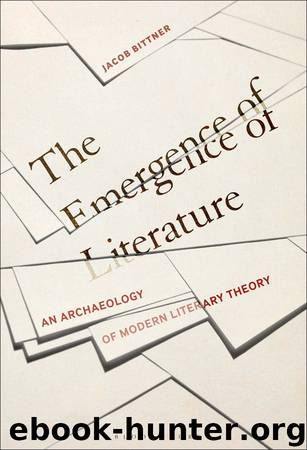The Emergence of Literature by Jacob Bittner;

Author:Jacob Bittner;
Language: eng
Format: epub
Publisher: Bloomsbury USA
The Question of a priori Poetry
The question is then how the artistic task is a political task of reading and writing the intransitive work. In Benjamin’s commentary, “The poetized will come to light as the precondition of the poem, as its inner form, as artistic task” (SW, 20). Benjamin will derive the poetized through an “aesthetic commentary” (SW, 18) on Hölderlin’s “The Poet’s Courage” (“Dichtermut”) and “Timidity” (“Blödigkeit”), which are understood as two actual manifestations of the poetized. For Benjamin, the question is to what extent art determines life in the two versions in such a way that the truth of literature emerges as a priori poetry.
The main difference between the two manifestations is “a dislocation of the mythological” (SW, 28), which takes place in the second version (“Timidity”). In the first version (“The Poet’s Courage”), the mythological sun god dissolves the figure of the poet and thereby obscures the concept of the poetized, which is reduced to partaking in the governing force of Greek mythology: “anankē reigns” (SW, 22), the goddess of destiny and necessity. “The Poet’s Courage” (first version) concerns a destiny (Schicksal) that Benjamin understands to be “the death of the poet” (SW, 22); however, this death does not “flow out of a pure, structured context” (SW, 23), that is, the life context determined by art. For Benjamin, the first version bears witness to the fact that “the poetic law [das dichterische Gesetz] has not yet fulfilled itself in this Hölderlinian world” (SW, 24/II:1, 111). In “The Poet’s Courage,” destiny is not purely literary destiny; rather, the necessity is more grounded in Greek mythology than in the mythic unfolding of the poetized. In the second version, on the contrary, the “gods and the living are bound together in the destiny of the poet by ties of iron” (SW, 24). “Timidity” (second version) is a configuration of the poetized that transcends traditional Greek mythology since the poet and the people (Volk) are included in the poetic destiny (see SW, 28).
My question is not whether Benjamin’s novel form of literary criticism can be “justified”; rather, I am concerned with the fact that Benjamin coins the critical concept of the poetized in order to write a form of literary criticism that should be able to be justified and that the concept of the poetized instantiates the paradigm of writerly necessity. In Benjamin’s criticism, the truth of literature emerges as the poet’s necessity to write intransitively insofar as the poetized is the life determined by art and art is a priori poetry. For Benjamin, sober writing is by definition a political practice. This practice of writing transforms the modalities of being: It is an intransitive writing that is the possibility of a pure passivity in which that which was never written retains itself as possibility.
In Benjamin’s later theses on history written in 1940, the thought of the “others” that never materialize themselves into actual poems can be understood to emerge in the context of Benjamin’s thinking of history as the “irretrievable
Download
This site does not store any files on its server. We only index and link to content provided by other sites. Please contact the content providers to delete copyright contents if any and email us, we'll remove relevant links or contents immediately.
4 3 2 1: A Novel by Paul Auster(11094)
The handmaid's tale by Margaret Atwood(6891)
Giovanni's Room by James Baldwin(5921)
Big Magic: Creative Living Beyond Fear by Elizabeth Gilbert(4750)
Asking the Right Questions: A Guide to Critical Thinking by M. Neil Browne & Stuart M. Keeley(4619)
On Writing A Memoir of the Craft by Stephen King(4240)
Ego Is the Enemy by Ryan Holiday(4019)
Ken Follett - World without end by Ken Follett(3990)
The Body: A Guide for Occupants by Bill Bryson(3849)
Bluets by Maggie Nelson(3739)
Adulting by Kelly Williams Brown(3699)
Guilty Pleasures by Laurell K Hamilton(3611)
Eat That Frog! by Brian Tracy(3544)
White Noise - A Novel by Don DeLillo(3451)
The Poetry of Pablo Neruda by Pablo Neruda(3384)
Alive: The Story of the Andes Survivors by Piers Paul Read(3329)
The Book of Joy by Dalai Lama(3252)
The Bookshop by Penelope Fitzgerald(3244)
Fingerprints of the Gods by Graham Hancock(3235)
